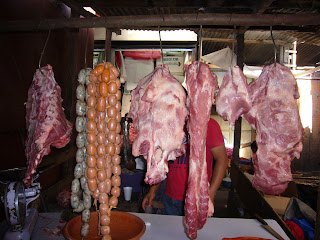http://www.facebook.com/album.php?aid=32387&l=7ff63&id=545832350

Mercado
The “mercado” in Antigua is held every Monday, Thursday and Saturday. During these three days, you can find hundreds of vendors selling anything from beef, eggs, dried beans, fruit and vegetables to live chickens, underwear and mosquito repellent.
 During these three days, many locals (and foreigners) go to the “mercado” to get the best bargain for their shopping needs. Just the other day, we bought over 3 pounds of oranges for under a dollar (and toilet paper for 40 cents). It definitely beats Walmart!
During these three days, many locals (and foreigners) go to the “mercado” to get the best bargain for their shopping needs. Just the other day, we bought over 3 pounds of oranges for under a dollar (and toilet paper for 40 cents). It definitely beats Walmart! Horses
We don't know a lot about horses nor do we ride them frequently. However, one obvious difference we noticed immediately is that horses here wear diapers (see photo). The diapers are made of corn or rice bags and hang directly under the horse's butt. We think this is a great idea and should be adopted in the US.

Toilet paper
The toilet paper here feels and acts the same but there is a one major difference: we can't toss toilet paper into the (toilet) bowl. Unfortunately, the pipes are not designed to process (toilet) paper so it must be thrown into a trash can. Although this was a hard concept for me (Agnes) to grasp at first, it's simply business as usual now. Que lastima!
Bugs
There are lots, especially mosquitoes and flies. Sometimes I wish I studied bugs and insects so I'd know how to keep the mosquitoes off. I've also seen (and continue to see) some of the largest cockroaches in my lifetime. Sorry the photo is awful but I typically do not have my camera when I encounter one.

Relationships
Just through sheer observation, we've noticed that more Guatemalan men here date foreign women. We have yet to see a Guatemalan woman with a foreign man. Not sure why that is but what we do know is that women tend to be more reserved here, since it's a very small town and word travels fast.






